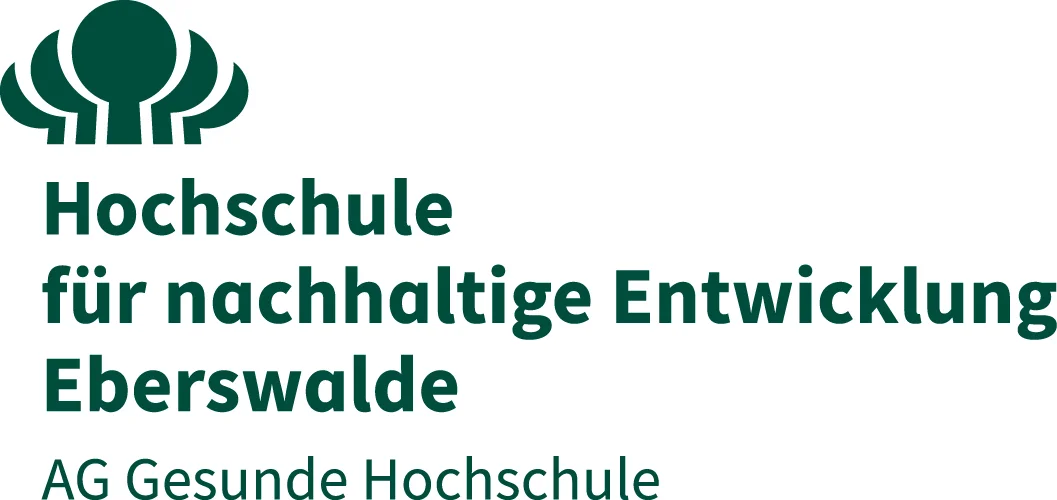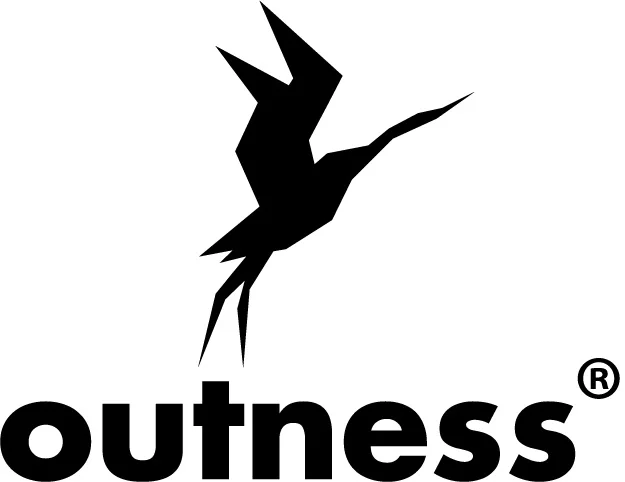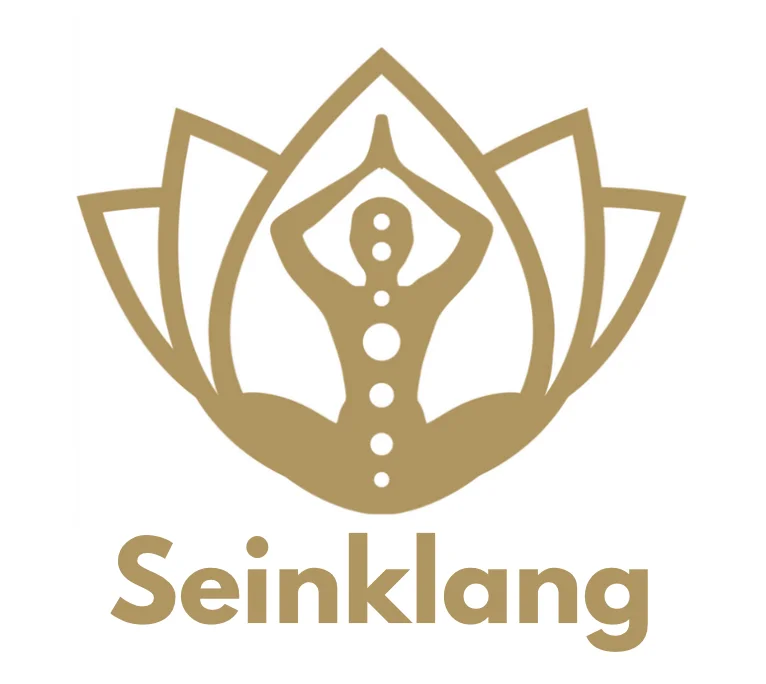10th Health Day on 16 October 2025
Our Health Day Anniversary: Recharge, Rebalance, and Reconnect
Our annual Health Day gives students and employees the chance to explore a range of health-focused activities, pick up fresh ideas for a balanced lifestyle, and discover practical tips for stress management and prevention.
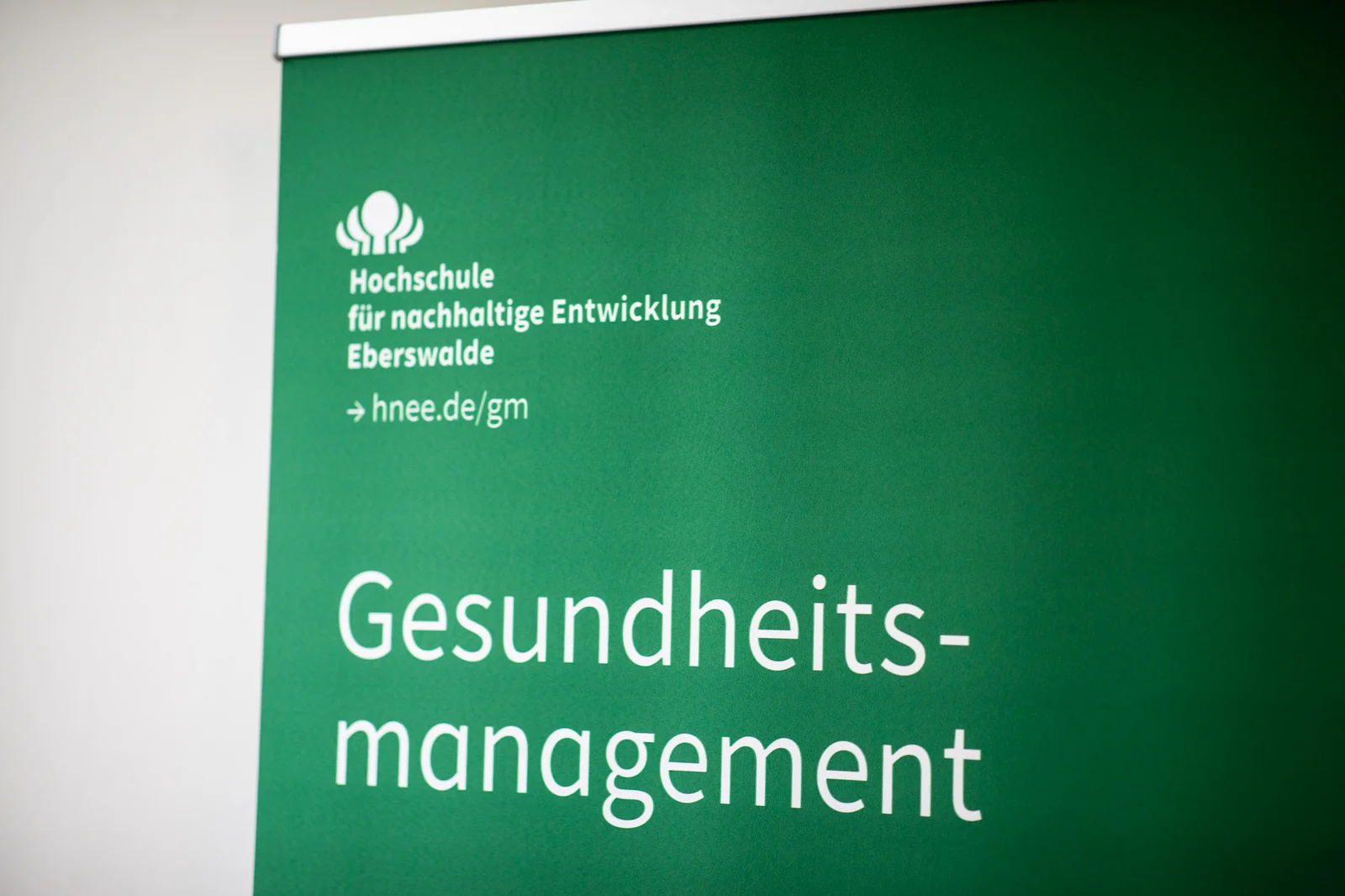
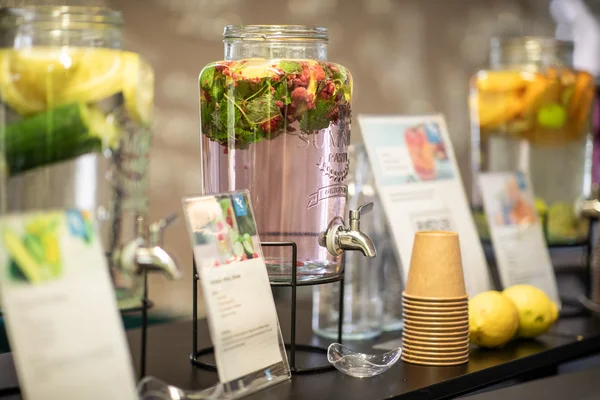
Impressions of the Health Day 2024 at HNEE
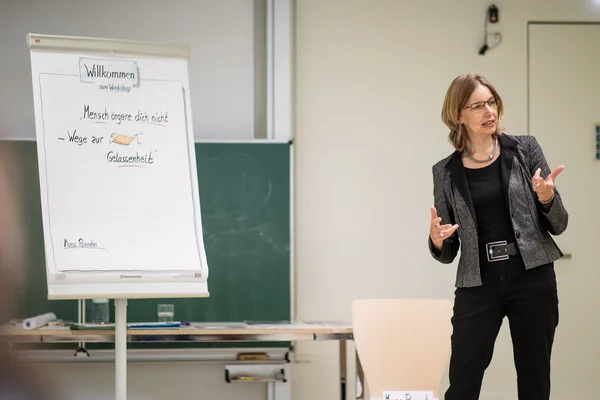
Impressions of the Health Day 2024 at HNEE
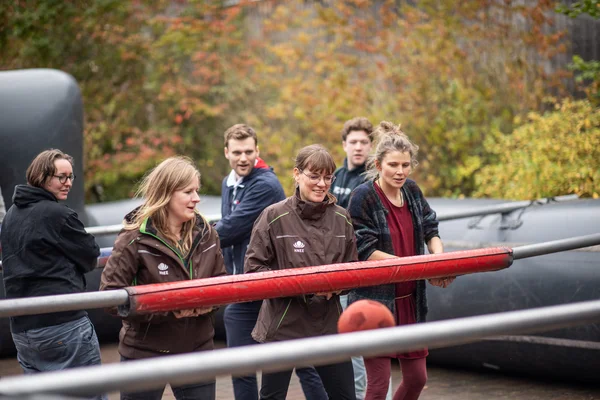
Impressions of the Health Day 2024 at HNEE
Programme
City Campus | Building 5
10:30 a.m. | Opening by the university management
For better planning, we look forward to your registration.
10:45 a.m. | Opening lecture "Why is it worth it?" with Babette Halbe-Haenschke
11:30 a.m. | Lunch in the canteen on the city campus with special menus for the 10th Health Day (at a special price)
from 1:30 p.m. | Start of the workshops
Registration is required for participation in the workshops.
Discover how simple eye movements and relaxation techniques can improve your visual wellbeing.
with Hoffi from Hoffmann & Brillen
- A brief introduction to the topic of refined sugar
- Presentation of natural sugar alternatives
- Hands-on session: prepare a small sugar-free treat to take home (energy balls)
- Workshop goal: Participants will learn about the health benefits of a sugar-free diet and explore natural alternatives to conventional white sugar.
with qualified teacher Katharina Haas
Men’s health is often underestimated in public discourse or overshadowed by stereotypes. Phrases like “man flu” and clichés around a lack of resilience obscure the reality that many men tend to neglect their own health — particularly their mental wellbeing. Traditional gender roles, professional pressure, and social expectations frequently lead men to overlook warning signs and perceive self-care as a weakness.
In this keynote, psychologist Jörg Bergmann highlights how self-care is not a contradiction to strength, but a reflection of genuine masculinity. Alongside insights into societal structures and personal attitudes, the session presents practical strategies to help men improve both their physical and mental health — from routine check-ups and stress management to everyday self-care tools.
Topics covered:
- Social pressures, role models, and how they impact men’s health
- Mental health challenges and common risk factors (e.g. suicidal thoughts, risk-taking behaviour, chronic stress)
- Practical strategies to support better self-care and preventive health
Aims of the session:
- Raise awareness of gender-specific challenges in men’s health
- Encourage men to take an active role in managing their health
- Offer practical tools to improve overall wellbeing and quality of life
Women face unique pressures in both their professional and personal lives that can significantly impact their mental health. Alongside the demands of care responsibilities, diverse role expectations, and high-performance standards at work, crises such as the COVID-19 pandemic have intensified existing burdens. Remote work, home schooling, and limited access to childcare have contributed to a marked increase in stress levels for many women. The consequences can range from chronic stress to depression and anxiety disorders — all of which, according to statistics, affect women more frequently than men.
This keynote explores both external stressors and the internal beliefs that shape how we manage them. One key focus is imposter syndrome, a common challenge for women in professional contexts. The session also offers insights into how women can strengthen protective factors and actively support their own mental wellbeing.
Topics covered:
- Current research on women’s mental health: risk and protective factors
- The impact of inner beliefs on mental wellbeing
- Imposter syndrome in professional life and its consequences
Aims of the Session:
- Raise awareness of gender-specific mental health risk factors affecting women
- Encourage self-reflection on limiting beliefs and thought patterns
- Present strategies for building resilience and strengthening mental health
Tablet, mobile phone, PC, sun - blue light: blessing or curse?
with Hoffi from Hoffmann & Brillen
- A brief introduction to the topic of refined sugar
- Presentation of natural sugar alternatives
- Hands-on session: prepare a small sugar-free treat to take home (energy balls)
- Workshop goal: Participants will learn about the health benefits of a sugar-free diet and explore natural alternatives to conventional white sugar.
with qualified teacher Katharina Haas
Queer individuals experience health within a unique area of tension: while they are part of a vibrant, diverse community, they continue to face discrimination, marginalisation, and structural barriers. This multiple burden can have a significant impact on mental wellbeing. Research shows that LGBTQ+ people are more likely to experience depression, anxiety, or suicidal thoughts — not because of their identity, but as a result of social stigmatisation and minority stress.
In this keynote, Ska Salden explores the specific challenges surrounding queer health. In addition to examining risk factors such as discrimination and internalised stigma, the session highlights protective factors including community belonging, empowerment, and resilience-building strategies. The aim is to foster a deeper understanding of queer lived experiences and offer practical approaches to strengthening mental wellbeing in this context.
Topics covered:
- Minority stress and its impact on mental health
- The role of community, visibility, and empowerment
- Practical strategies to support resilience and self-care
Aims of the Session:
- Raise awareness of the specific health needs of LGBTQ+ individuals
- Build understanding of structural challenges and their psychological impacts
- Share strategies for empowerment and improved mental wellbeing
Women face unique pressures in both their professional and personal lives that can significantly impact their mental health. Alongside the demands of care responsibilities, diverse role expectations, and high-performance standards at work, crises such as the COVID-19 pandemic have intensified existing burdens. Remote work, home schooling, and limited access to childcare have contributed to a marked increase in stress levels for many women. The consequences can range from chronic stress to depression and anxiety disorders — all of which, according to statistics, affect women more frequently than men.
This keynote explores both external stressors and the internal beliefs that shape how we manage them. One key focus is imposter syndrome, a common challenge for women in professional contexts. The session also offers insights into how women can strengthen protective factors and actively support their own mental wellbeing.
Topics covered:
- Current research on women’s mental health: risk and protective factors
- The impact of inner beliefs on mental wellbeing
- Imposter syndrome in professional life and its consequences
Aims of the Session:
- Raise awareness of gender-specific mental health risk factors affecting women
- Encourage self-reflection on limiting beliefs and thought patterns
- Present strategies for building resilience and strengthening mental health
Men’s health is often underestimated in public discourse or overshadowed by stereotypes. Phrases like “man flu” and clichés around a lack of resilience obscure the reality that many men tend to neglect their own health — particularly their mental wellbeing. Traditional gender roles, professional pressure, and social expectations frequently lead men to overlook warning signs and perceive self-care as a weakness.
In this keynote, psychologist Jörg Bergmann highlights how self-care is not a contradiction to strength, but a reflection of genuine masculinity. Alongside insights into societal structures and personal attitudes, the session presents practical strategies to help men improve both their physical and mental health — from routine check-ups and stress management to everyday self-care tools.
Topics covered:
- Social pressures, role models, and how they impact men’s health
- Mental health challenges and common risk factors (e.g. suicidal thoughts, risk-taking behaviour, chronic stress)
- Practical strategies to support better self-care and preventive health
Aims of the session:
- Raise awareness of gender-specific challenges in men’s health
- Encourage men to take an active role in managing their health
- Offer practical tools to improve overall wellbeing and quality of life
Did you know that you can improve your sleep by making targeted changes to your diet? You sleep the way you eat?
Of course, it’s not always easy to keep an eye on your nutrition while managing deadlines and responsibilities during your studies. But your sleep is crucial to your performance — and that’s a good reason to take a closer look.
In the interactive Expert Talk "Sleep Meets Food", you will learn how a balanced diet can help promote better sleep quality. Expert Katharina Wenkoff will take you on a culinary journey straight to the land of dreams.
What to expect:
- The basics and importance of sleep
- Insights into the mental and physical effects of sleep deprivation
- Information about the connection between sleep and nutrition
- Tips for sleep hygiene and optimising your sleep
📅 The event is free of charge, so be there on 16 October 2025 at 15:30-16:30 - did you know you can improve your sleep through targeted changes to your diet? You sleep how you eat?
an offer for students from the BARMER Campus Coach
- Short introduction to sound relaxation and important contraindications
- Followed by a sound bath using Tibetan singing bowls, crystal singing bowls, and other natural instruments
- Aim: Participants experience individual deep relaxation
with qualified teacher Katharina Haas
Supporting programme
09:00 - 16:30 | Eye check(with advance booking)
Eye check with Ahmad from Hoffmann & Brillen
Take a journey inside the body’s most important sensory organ and discover the fascinating abilities of the eyes.
- Medical history
- Vision assessment
- Retinal analysis
- Evaluation (AI-supported analysis of the retinal image)
10:00 - 14:45 | TRICURO go back check(with advance booking)
How flexible is your back?
Almost everyone has experienced back pain at some point. With the radiation-free TRICURO go measuring device, a kind of “fingerprint” of your spine is created. After the scan, you will receive an analysis of the shape, mobility, and posture of your spine. Based on your individual results, you will also receive professional counselling – including recommendations and movement exercises to help improve or maintain your values.
an offer from BARMER
10:00 - 16:00 hrs | VR Relaxation Goggles
Guided mental relaxation and stress management in virtual worlds.
10:00 - 16:00 hrs | ICAROS VR training
Playful training to promote balance, reaction and coordination. VR movement experience with the ICAROS
10:00 - 17:00 hrs | Body Check - Body Composition Analysis (with advance booking)
For a healthy centre!
The number on the scale is often seen as the main indicator of health and fitness — but it does not tell the full story. Whether the scale is your best friend or your worst enemy, there are far more meaningful ways to understand what’s really going on in your body. One of them is by measuring your body composition. With the BARMER Body Check, you will find out in just 20 minutes what your body is made of — and what you can do if you would like to change something about it. The following values will be measured:
- Body Mass Index (BMI)
- Body fat percentage
- Visceral fat level
- Muscle mass
- Basal metabolic rate
an offer from BARMER
13:00 - 16:30 | Vitamin bar in the foyer
Vitamins for everyone – brought to you by Partners for Health e.V.
13:00 - 17:00 | T-Wall reaction wall in front of Building 5
Top-tier reaction testing!
The interactive T-Wall reaction wall is suitable for a wide range of uses, is always a real eye-catcher, and encourages healthy movement. With a variety of reaction games for all ages, it challenges not only your speed and accuracy, but also your hand-eye coordination. Whether playing solo, in a head-to-head match, or as part of a team — the T-Wall gets everyone moving!
It trains:
- Peripheral vision
- Reaction time
- Concentration
an offer of the TK - Die Techniker
Participation counts as working time and is free of charge.
With the kind support of:
